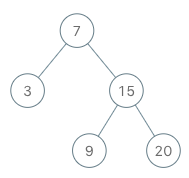173. Binary Search Tree Iterator
Medium
Implement an iterator over a binary search tree (BST). Your iterator will be initialized with the root node of a BST.
Calling next() will return the next smallest number in the BST.
Example:

BSTIterator iterator = new BSTIterator(root); iterator.next(); // return 3 iterator.next(); // return 7 iterator.hasNext(); // return true iterator.next(); // return 9 iterator.hasNext(); // return true iterator.next(); // return 15 iterator.hasNext(); // return true iterator.next(); // return 20 iterator.hasNext(); // return false
Note:
next()andhasNext()should run in average O(1) time and uses O(h) memory, where h is the height of the tree.- You may assume that
next()call will always be valid, that is, there will be at least a next smallest number in the BST whennext()is called.
1 2 3 4 5 6 7 8 9 10 11 12 13 14 15 16 17 18 19 20 21 22 23 24 25 26 27 28 29 30 31 32 33 34 35 36 37 38 39 40 41 42 43 44 45 46 47 48 49 | /** * Definition for binary tree * struct TreeNode { * int val; * TreeNode *left; * TreeNode *right; * TreeNode(int x) : val(x), left(NULL), right(NULL) {} * }; */ class BSTIterator { stack<TreeNode*> stk; public: BSTIterator(TreeNode *root) { TreeNode *p = root; while(p){ stk.push(p); p = p->left; } } /** @return whether we have a next smallest number */ bool hasNext() { return !stk.empty(); } /** @return the next smallest number */ int next() { TreeNode* node = stk.top(); stk.pop(); TreeNode* p = node->right; while(p){ stk.push(p); p = p->left; } return node->val; } }; /** * Your BSTIterator will be called like this: * BSTIterator i = BSTIterator(root); * while (i.hasNext()) cout << i.next(); */ /** * Your BSTIterator will be called like this: * BSTIterator i = BSTIterator(root); * while (i.hasNext()) cout << i.next(); */ |
1 2 3 4 5 6 7 8 9 10 11 12 13 14 15 16 17 18 19 20 21 22 23 24 25 26 27 28 29 30 31 32 33 34 35 36 37 38 39 40 41 42 43 44 | /** * Definition for a binary tree node. * public class TreeNode { * int val; * TreeNode left; * TreeNode right; * TreeNode() {} * TreeNode(int val) { this.val = val; } * TreeNode(int val, TreeNode left, TreeNode right) { * this.val = val; * this.left = left; * this.right = right; * } * } */ class BSTIterator { Stack<Integer> stk = new Stack(); public void build(TreeNode node){ if(node==null) return; build(node.right); stk.push(node.val); build(node.left); } public BSTIterator(TreeNode root) { build(root); } /** @return the next smallest number */ public int next() { return stk.pop(); } /** @return whether we have a next smallest number */ public boolean hasNext() { return !stk.isEmpty(); } } /** * Your BSTIterator object will be instantiated and called as such: * BSTIterator obj = new BSTIterator(root); * int param_1 = obj.next(); * boolean param_2 = obj.hasNext(); */ |
No comments:
Post a Comment